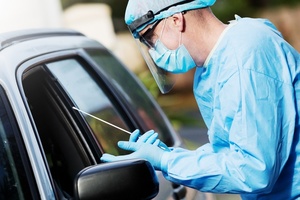New Lighthouse Lab to boost NHS Test and Trace capacity
Lab capacity to continue to increase ahead of winter, with a new Lighthouse Lab set to open near Loughborough by the end of September.

-
NHS Test and Trace continues to reach the majority of those testing positive and their contacts in week 13 of operation
-
Brand new large-scale technology to increase the number of tests that NHS and Lighthouse Labs can process is being introduced
A new Lighthouse Lab near Loughborough will join Britain’s largest network of diagnostic testing facilities in history to increase coronavirus testing capacity.
The new lab will be brought into the lab network this month and will be able to process around 50,000 tests per day by the end of the year.
This comes as the weekly statistics from NHS Test and Trace show that the service continues to reach the majority of those testing positive and their contacts, in week 13 reaching 80% of contacts where contact information was available.
Demand for testing continues to rise, with those tested for the first time increasing by 63% since mid-June.
The new lab is part of plans to scale up testing capacity to 500,000 swab tests per day by the end October. There is currently capacity for 350,000 tests each day in the UK, across all 4 testing pillars including antibody tests and surveillance studies. The growth in demand means that existing capacity for pillar 2 swab tests is being fully utilised and in line with existing plans, the capacity is being quickly expanded.
Alongside increased Lighthouse Lab capacity, brand new large-scale processing units are being rolled out for use across both NHS and Lighthouse Labs.
Today £500 million has been announced to increase capacity and roll out new cutting-edge testing technology to deliver rapid tests. Chains of transmission will be broken almost immediately by delivering on-the-spot results. Successful trials will then be expanded and rolled out further, with new tests being used in Salford, Southampton and Hampshire over the coming weeks.
NHS Test and Trace continues to focus efforts to uplift testing by working closely with local authorities and communities where there is high prevalence of the virus.
Interim Executive Chair of the National Institute for Public Health, Baroness Dido Harding, said:
NHS Test and Trace has been operating for more than 3 months and during that time it has consistently reached the majority of those testing positive and their contacts, almost 330,000 people at risk of unknowingly passing the virus on.
As the service has become part of our everyday lives, demand for testing has increased. To meet this, we continue our efforts to build and scale testing capacity to reach 500,000 tests per day by the end of October by making use of new tests, new labs and new technology.
Thanks to all the people who have come forward for a free test, and the vital work of local teams around the country making sure people are aware of testing we are breaking chains of transmission. The advice remains the same: if you have symptoms of coronavirus get tested and if you are contacted by NHS Test and Trace, follow the advice you receive.
From this week, the new equipment which will boost processing capacity for each lab beyond 100,000 tests a day will be trialled in the Milton Keynes Lighthouse Lab. The technology will allow labs to process a higher number of test samples simultaneously, reduce costs, and will be able to process saliva-based tests being piloted in Southampton and Salford announced today.
Increased lab capacity across the country will help to further improve test turnaround times while meeting additional demand, with this week’s NHS Test and Trace statistics showing that 84.3% of in-person test results already being returned the day after a test was taken. The median average time it takes for a test result to be returned from a drive-through or walk-through test site is now only 24 hours, or 22 hours at a mobile testing unit.
Since launching in May, the service has reached almost 330,000 people at risk of unknowingly passing the virus on, significantly curbing the spread of coronavirus in England.
These figures demonstrate that NHS Test and Trace continues to perform well against international contact tracing standards.
Statistics from the 13th week of operation of NHS Test and Trace (20 to 26 August) show that since the service launched:
-
327,927 people have been reached by the service. This includes both those testing positive and their contacts
-
79.7% of all contacts identified were reached, which increases to 87.7% for those we had contact information for
-
78.5% of people testing positive and transferred to the contact tracing system were reached since launch
-
4,833,347 people have been newly tested under pillars 1 and 2
In the latest week (20 to 26 August):
-
81.4% of people testing positive and transferred to the contact tracing system were reached
-
80.0% of contacts we had information for were reached
-
452,679 people have been newly tested under pillars 1 and 2
Background information
New testing technology is being supplied by LGC to Milton Keynes Lighthouse Lab. Each LGC machine is able to process up to 150,000 tests per day, at reduced cost and speed.